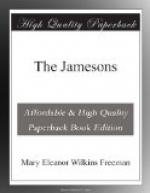We were so thankful that none of the out-of-town celebrities ate Mrs. Jameson’s chicken pies, since they had a rather unfortunate experience as it was. The dinner was a very great success, and Flora Clark said to me that if people a hundred years ago ate those hearty, nourishing victuals as these people did, she didn’t wonder that the men had strength to found a Republic, but she did wonder how the women folks who had to cook for them had time and strength to live.
After dinner the speechifying began. The Rev. Henry P. Jacobs made the opening address; we had agreed that he should be invited to do so, since he was the minister. He asked the blessing before we began to eat, and made the opening address afterward. Mr. Jacobs is considered a fine speaker, and he is never at a loss for ideas. We all felt proud of him as he stood up and began to speak of the state of the Linnville church a hundred years ago, and contrasted those days of fireless meeting-houses with the comforts of the sanctuary at the present time. He also had a long list of statistics. I began at last to feel a little uneasy lest he might read his poem, and so rob the guests who were to speak of their quotas of time. Louisa said she thought he was intending to, but she saw Mrs. Jameson whisper to her husband, who immediately tiptoed around to him with a scared and important look, and said something in a low voice. Then the minister, with a somewhat crestfallen air, curtailed his remarks, saying something about his hoping to read a poem a little later on that auspicious occasion, but that he would now introduce Mrs. H. Boardman Jameson, to whom they were all so much indebted.
Mrs. Jameson arose and bowed to the company, and adjusted her eyeglasses. Her jets glittered, her eyes shone with a commanding brightness, and she really looked very imposing. After a few words, which even Flora Clark acknowledged were very well chosen, she read the Governor’s letter with great impressiveness. Then she went on to read other letters from people who were noteworthy in some way and had some association with the village. Flora Clark said that she believed that Mrs. Jameson had written to every celebrity whose grandfather ever drove through Linnville. She did have a great many letters from people who we were surprised to hear had ever heard of us, and they were very interesting. Still it did take time to read them; and after she had finished them all, Mrs. Jameson commenced to speak on her own account. She had some notes which she consulted unobtrusively from time to time. She dwelt mainly upon the vast improvement for the better in our condition during the last hundred years. She mentioned in this connection Robert Browning, the benefit of whose teaching was denied our ancestors of a hundred years ago. She also mentioned hygienic bread as a contrast to the heavy, indigestible masses of corn-meal concoctions and the hurtful richness of pound-cake. Mrs. Jameson galloped with mild state all her little hobbies for our delectation, and the time went on. We had sat very long at dinner; it was later than we had planned when the speechifying began. Mrs. Jameson did not seem to be in the least aware of the flight of time as she peacefully proceeded; nor did she see how we were all fidgeting. Still, nobody spoke to her; nobody quite dared, and then we thought every sentence would be her last.




